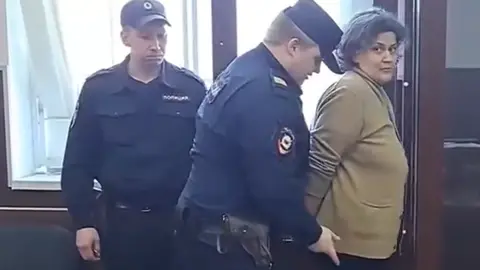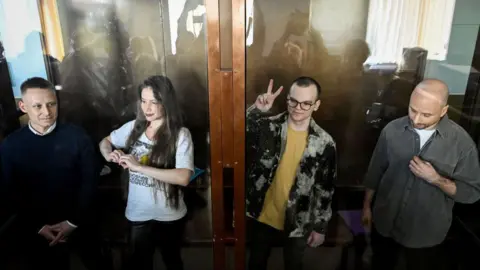Russian hairdresser jailed over neighbour claim of spreading fake news
 Pushkin court press service
Pushkin court press serviceA hairdresser from St Petersburg has been given a jail term of five years and two months on a charge of spreading fake news about the Russian army.
Anna Alexandrova denied posting eight anti-war messages on social media, insisting the case was motivated by a squabble over land with a neighbour.
Her neighbour told the BBC that she had complained to prosecutors after Alexandrova had sent her daughter pictures of the war in Ukraine.
Discrediting the armed forces and intentionally spreading fake news about the military became a crime in Russia within weeks of the full-scale invasion of Ukraine in February 2022.
Ever since the war began, the Kremlin has intensified a crackdown on dissent, jailing hundreds of opponents and critics and silencing independent media.
In a separate case on Tuesday, four journalists were jailed in Moscow for five and a half years after being found guilty of working for an "extremist organisation".
Antonina Favorskaya, Kostantin Gabov, Sergey Karelin and Artyom Kriger had all insisted they were only doing their jobs as journalists, but the court found they had produced work used by an anti-corruption group founded by Putin's chief opponent Alexei Navalny.
Navalny was found dead in a penal colony in the Arctic Circle last year. Video captured by Favorskaya on a courtroom video link the day before Navalny's controversial death was the last time he was ever seen alive.
Favorskaya worked for independent outlet SotaVision and was eventually arrested in March 2024 filming in a cemetery where he was buried.
 Getty Images
Getty ImagesRussia's restrictive laws on dissent have ensnared people from all walks of life.
Denunciations have led to prison terms and Russians have informed on their colleagues and other people they know, in actions reminiscent of the Soviet era when a boy called Pavlik Morozov was lionised for betraying his own father.
Hairdresser Anna Alexandrova, a 47-year-old mother of two children, was first arrested in November 2023 for eight posts she shared via two anonymous accounts on Russian social network VKontakte.
When BBC Russia Editor Steve Rosenberg visited the court last September, Alexandrova's lawyer told him that the case had started out as an ordinary domestic squabble over land.
"One side went to the police but got nowhere. That only changed when the charge of 'fake news about the army' appeared," said Anastasia Pilipenko.
Steve Rosenberg: How snitching case evokes ghosts of Soviet past
It emerged that Anna Alexandrova had initially been on the same side as her neighbour in fighting local deforestation by developers in the village of Korpikyulya, south of St Petersburg.
But they eventually fell out in a row that became increasingly acrimonious.
Although Alexandrova denied sending images from the war to her neighbour, the court sent her to a penal colony and ordered her not to post any further material for the next three years.
Meanwhile, lawyers for a Moscow councillor who was given the first full jail term in July 2022 under the "fake news" law have filed a complaint against the offence with Russia's constitutional court.
Alexei Gorinov was initially given seven years in jail after he was filmed criticising Russia's invasion at a council meeting. He had objected to the idea of a children's drawing contest being held when children were dying in Ukraine.
That initial sentence was extended by a further three years last year when he was accused of criticising the war in a prison hospital.
In a statement on Tuesday, lawyers Katerina Tertukhina and Olga Podoplelova said the 2022 article aimed at combating disinformation did not serve constitutionally legitimate aims.
"Under the guise of protecting public order, it is used to punish anti-war views, criticism of authorities, and the dissemination of information - including truthful information - if it contradicts the official narrative," the lawyers argued.
